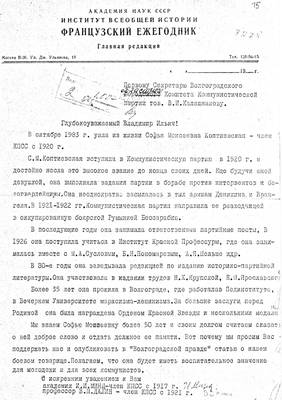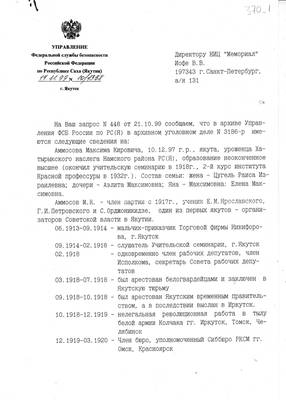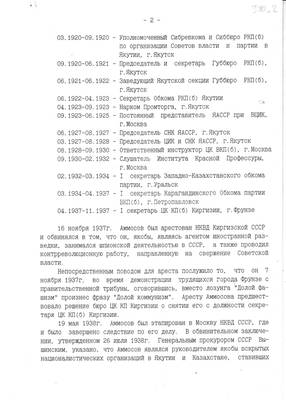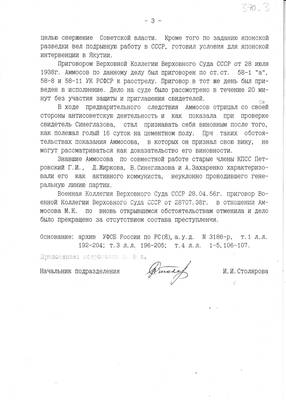Yaroslavsky Emelyan Mikhailovich
Other names:
Gubelman Miney Izrailevich
Definition:
Historian, publicist, Communist Party activist. Academician of the USSR Academy of Sciences (1939). Ideologist and leader of anti-religious policy in the USSR. Chairman of the "Union of Militant Atheists"
Years of life: 1878-1943
Info:
Доп. инф.: сайт Российской академии наук
Documents (11)
Fund 08 / Inventory 1 / Case Адасинская Галина Антоновна
1. Interview with Adasinskaya G.A., taken by Kosinova T.F. 05/13/2004
файл (присоединённый)
Adasinskaya Alexandra Abramovna,
Adasinskaya Galina Antonovna,
Adasinskaya Olga Pavlovna,
Adasinsky Anton Ippolitovich,
Adasinsky Anton Stanislavovich,
Adasinsky Ippolit,
Adasinsky Eduard-Dmitry Antonovich,
Akishin Leonid Ilyich,
Babin Leonid Osipovich,
Bendersky Roman Zakharovich,
Broido Vera Markovna,
Broido Daniil Markovich,
Broydo Eva Lvovna,
Broido Mark Isaevich,
Vetrova Galina,
Ginzbur Osip Romanovich,
Israelite (Israelite),
Con Norman,
Kosinova Tatyana Feofanovna,
Lavrov Petr Mikhailovich,
Lindberg Leonid Fedorovich,
Morozov Nikolai Alexandrovich,
Nick Cohn,
Panin Dmitry Mikhailovich,
Pryanishnikov,
Rekhes Boris Alexandrovich,
Stasova Elena Dmitrievna,
Stepanyuk-Benevskaya Maria Arkadyevna,
Tikhonov Nikolay,
Shapiro Inna,
Shpilbauer Antonina Iosifovna,
Edelman Abram,
Yurkevich Yuri Lvovich,
Yaroslavsky Emelyan Mikhailovich
2004
Fund 06 / Inventory 1 / Case Дубинин Дмитрий Васильевич
1. Memoirs of Dubinin D.V.
The author's memoirs are preceded by a preface by his son, which indicates the main facts of his father's biography.
During the Civil War, active Komsomol work, in 1921 he was sent by the Gubkomol to study at the Leningrad Medical Institute, where he combined classes with work as the executive secretary of the Komsomol organization. After graduating from the institute in 1928, he studied at the GIDUV graduate school. Since 1931 until 1937, head of the City Health Department, head of the department of science, etc. 1937 - arrest. At the same time, the author's wife, who worked as a doctor at the Bekhterev Institute, was exiled to the Ryazan region, from where in 1953 she left for her husband to the north, to the village of Olchan.
The fictionalized, chapterized memoirs cover the period from the day of the author's arrest to his rehabilitation, shortly after which, in October 1957, he died. In addition to memoirs, there are documents, letters from his wife, her story about the decision to go to her husband, about parting with relatives and friends, and about a trip to Kolyma.
Night call at the door. The appearance in the apartment of the military. bewilderment
the author, who is sure that this is a mistake, because he is a committed communist. Search. The apartment is a trap: they let you in here, but not from here. Selection of "seditious books" (their names). Confiscation of photographs, seizure of archives
district Komsomol organization. Delivery of the arrested person to the Big House by tram. Jail. Fixation in memory of all prison signs: a deep well in the yard, an exciting autumn smell from outside, pigeons, a dimly lit corridor, etc. A description of the humiliating inspection of a prisoner. Solitary confinement with another prisoner. The tightness is such that there is no way to sit on the floor and they stand close to each other. Thorough check of clothes, shoes, seizure of personal belongings, cutting of buttons and hooks, etc. Sorting chamber, “dog lover”. Artists of the Musical Comedy Theater arrested immediately after the tour. Talking to a neighbor about multiple arrests. Confusion on both sides. Meeting in a cell with a well-known director of the largest medical plant. An imaginary conversation between the author and an investigator, who may turn out to be his acquaintance from the Bolshoy Dom, who recently talked with him about Shostakovich's music, an intelligent and well-mannered man who shook hands with him at the end of the conversation, during which he showed himself to be a real Chekist from Dzerzhinsk, convinced that there are enemies all around (with which the author so far agrees), but that the prisoner called for interrogation is not guilty of anything.
New Year's Eve, 1939. Especially the oppressed state of the author's cellmates. Story about some of them.
Stage. Shipping in Chelyabinsk. Bath. A barrack filled with people so that some people are forced to stand for a day. Unbearable suffering from stuffiness. The author's retelling of books to the prisoners, for which he gets a place on the upper bunk, where the criminals are located.
Kolyma camp. Description of the northern edge, its climate, nature. Path to work. Sheepdogs. View from afar of the faces, people working there. Feeling of fear. First day at the slaughter. The author is a "carrier", a detailed description of the features of this work. Summer 1939. Kolyma rainy weather. A barrack with a leaking roof, windows covered with canvas. Work in the face during the flood. Rumors about the heroic work of people to save equipment on the bridge over the Kolyma River. A competition between the best miners (among them the author) to speed up the installation of ventilation in the mine where their comrades worked. Despite the monstrous difficulties, the author works with enthusiasm (he is a "record holder"). Exhausting labor of hungry people during the war. The work of the author as a doctor, at first simultaneously with work in the face. Reading Chekhov, Hegel, books on the history of art. Presentation of the author as an excellent worker for early release.
Construction of a hospital on Indigirka. Work as a prospector at a new mine. The author is "the best washer of the mine of the Directorate." Appointment as chief doctor of the taiga hospital at the Olchan mine. Epidemic of paratyphoid, with which the author also falls ill. Report on typhus (during illness) at the conference of doctors of Indigirka, which was a huge success.
1947 End of term. There are five years of disenfranchisement ahead. The decision to stay at the Olchan mine as the head of the medical unit.
Poetic memoirs about the nature of the north, about the titanic work of the people living there, about the changes in the taiga that have occurred thanks to them. The construction of a new hospital, the initiator and energetic leader of which is the author. Involvement of medical staff and chronically ill patients in this work. The enthusiasm with which he managed to infect all the builders. His sense of pride in the people involved in the common cause.
In 1950, a heart attack. The flood of 1953, during which he traveled 40 kilometers "along the stormy mountain rivers waist-deep in water", fulfilling the duty of a doctor.
This is followed by letters from his wife to the author, in which she shares with him her anxiety about her move from Stavropol to him in Kolyma, and then her memories of how she got to Olchan, how she met her husband 16 years later.
Continuation of the author's memoirs. Frosts, sometimes over 60 degrees. Constant, day and night, calls to patients several kilometers from the hospital. Fatigue. Pride for his wife, who is called Princess Volkonskaya in Indigirka and who enthusiastically got involved in the work of equipping the hospital.
Moving his wife to Nehru, where she could work in her specialty. Permission received by the author for a trip to the village of Nera for a period of 5 days. On the way there was an accident - the car went into a ditch. Severe leg fracture.
September 7, 1954 release from exile. Flight with a cast leg on a transport plane with transfers to Kazan, from there to IL
to Moscow.
Full rehabilitation in July 1955. Heart attack. The author's conviction that he was right in not separating his life from the ideals of his country.
Letter from Z. Kavukchan, quoting a fragment from the 24th song of "Hell" to Dante to support the spirit of his camp friend. The last chapter of the memoirs is a summing up of the life lived: it was harsh, but honest and persistent, and the author, if there was such an opportunity, would repeat it again.
The memoirs are accompanied by a fragment (“About the Valuit family”) from the author’s notes and a poem by Valuit Nora, dedicated to her mother and written in 1940 in the camp where she ended up after her parents were arrested in 1939 and where she died in 1943 3 months before her release.
The annotation was compiled by Zhidkova T.G.
During the Civil War, active Komsomol work, in 1921 he was sent by the Gubkomol to study at the Leningrad Medical Institute, where he combined classes with work as the executive secretary of the Komsomol organization. After graduating from the institute in 1928, he studied at the GIDUV graduate school. Since 1931 until 1937, head of the City Health Department, head of the department of science, etc. 1937 - arrest. At the same time, the author's wife, who worked as a doctor at the Bekhterev Institute, was exiled to the Ryazan region, from where in 1953 she left for her husband to the north, to the village of Olchan.
The fictionalized, chapterized memoirs cover the period from the day of the author's arrest to his rehabilitation, shortly after which, in October 1957, he died. In addition to memoirs, there are documents, letters from his wife, her story about the decision to go to her husband, about parting with relatives and friends, and about a trip to Kolyma.
Night call at the door. The appearance in the apartment of the military. bewilderment
the author, who is sure that this is a mistake, because he is a committed communist. Search. The apartment is a trap: they let you in here, but not from here. Selection of "seditious books" (their names). Confiscation of photographs, seizure of archives
district Komsomol organization. Delivery of the arrested person to the Big House by tram. Jail. Fixation in memory of all prison signs: a deep well in the yard, an exciting autumn smell from outside, pigeons, a dimly lit corridor, etc. A description of the humiliating inspection of a prisoner. Solitary confinement with another prisoner. The tightness is such that there is no way to sit on the floor and they stand close to each other. Thorough check of clothes, shoes, seizure of personal belongings, cutting of buttons and hooks, etc. Sorting chamber, “dog lover”. Artists of the Musical Comedy Theater arrested immediately after the tour. Talking to a neighbor about multiple arrests. Confusion on both sides. Meeting in a cell with a well-known director of the largest medical plant. An imaginary conversation between the author and an investigator, who may turn out to be his acquaintance from the Bolshoy Dom, who recently talked with him about Shostakovich's music, an intelligent and well-mannered man who shook hands with him at the end of the conversation, during which he showed himself to be a real Chekist from Dzerzhinsk, convinced that there are enemies all around (with which the author so far agrees), but that the prisoner called for interrogation is not guilty of anything.
New Year's Eve, 1939. Especially the oppressed state of the author's cellmates. Story about some of them.
Stage. Shipping in Chelyabinsk. Bath. A barrack filled with people so that some people are forced to stand for a day. Unbearable suffering from stuffiness. The author's retelling of books to the prisoners, for which he gets a place on the upper bunk, where the criminals are located.
Kolyma camp. Description of the northern edge, its climate, nature. Path to work. Sheepdogs. View from afar of the faces, people working there. Feeling of fear. First day at the slaughter. The author is a "carrier", a detailed description of the features of this work. Summer 1939. Kolyma rainy weather. A barrack with a leaking roof, windows covered with canvas. Work in the face during the flood. Rumors about the heroic work of people to save equipment on the bridge over the Kolyma River. A competition between the best miners (among them the author) to speed up the installation of ventilation in the mine where their comrades worked. Despite the monstrous difficulties, the author works with enthusiasm (he is a "record holder"). Exhausting labor of hungry people during the war. The work of the author as a doctor, at first simultaneously with work in the face. Reading Chekhov, Hegel, books on the history of art. Presentation of the author as an excellent worker for early release.
Construction of a hospital on Indigirka. Work as a prospector at a new mine. The author is "the best washer of the mine of the Directorate." Appointment as chief doctor of the taiga hospital at the Olchan mine. Epidemic of paratyphoid, with which the author also falls ill. Report on typhus (during illness) at the conference of doctors of Indigirka, which was a huge success.
1947 End of term. There are five years of disenfranchisement ahead. The decision to stay at the Olchan mine as the head of the medical unit.
Poetic memoirs about the nature of the north, about the titanic work of the people living there, about the changes in the taiga that have occurred thanks to them. The construction of a new hospital, the initiator and energetic leader of which is the author. Involvement of medical staff and chronically ill patients in this work. The enthusiasm with which he managed to infect all the builders. His sense of pride in the people involved in the common cause.
In 1950, a heart attack. The flood of 1953, during which he traveled 40 kilometers "along the stormy mountain rivers waist-deep in water", fulfilling the duty of a doctor.
This is followed by letters from his wife to the author, in which she shares with him her anxiety about her move from Stavropol to him in Kolyma, and then her memories of how she got to Olchan, how she met her husband 16 years later.
Continuation of the author's memoirs. Frosts, sometimes over 60 degrees. Constant, day and night, calls to patients several kilometers from the hospital. Fatigue. Pride for his wife, who is called Princess Volkonskaya in Indigirka and who enthusiastically got involved in the work of equipping the hospital.
Moving his wife to Nehru, where she could work in her specialty. Permission received by the author for a trip to the village of Nera for a period of 5 days. On the way there was an accident - the car went into a ditch. Severe leg fracture.
September 7, 1954 release from exile. Flight with a cast leg on a transport plane with transfers to Kazan, from there to IL
to Moscow.
Full rehabilitation in July 1955. Heart attack. The author's conviction that he was right in not separating his life from the ideals of his country.
Letter from Z. Kavukchan, quoting a fragment from the 24th song of "Hell" to Dante to support the spirit of his camp friend. The last chapter of the memoirs is a summing up of the life lived: it was harsh, but honest and persistent, and the author, if there was such an opportunity, would repeat it again.
The memoirs are accompanied by a fragment (“About the Valuit family”) from the author’s notes and a poem by Valuit Nora, dedicated to her mother and written in 1940 in the camp where she ended up after her parents were arrested in 1939 and where she died in 1943 3 months before her release.
The annotation was compiled by Zhidkova T.G.
Memoirs of Dubinin D.V. , doc
125 листов, файл (присоединённый)
Adamov Vladimir,
Andrey Mitrofanovich,
Vladimir Petrovich,
Vyshinsky Andrey Yanuarievich,
Gilbo Grigory Zakharovich,
Gilbo Sonya Zakharovna,
Gilbo Esther Zakharovna,
Demetro,
Dzerzhinsky Felix Edmundovich,
Dubinin Valentin Vasilievich,
Dubinin Vasily Vasilievich,
Dubinin Dmitry Vasilievich,
Dudka,
Egorov Alexander Ilyich,
Yezhov Nikolay Ivanovich,
Elizaveta Savelyevna D.,
Zaushitsin Ivan Borisovich,
Zakhariev,
Zelenkevich,
Zyryanov,
Ibrahim,
Ivanov A.A.,
Komarov,
Krivoplyas,
Kropotkin Petr Alekseevich,
Kuznetsov Nikolay Mikhailovich,
Litvinov Maxim Maksimovich,
Matulevich Ivan Osipovich,
Moskin,
Nikolaenko,
Polosin Pavel,
Polyakov Yuri,
Sidorov,
Smorodin Petr Ivanovich,
Tandoora,
Trifonov Ivan Kuzmich,
Tukhachevsky Mikhail Nikolaevich,
Frese Vasily Vasilievich,
Chicherin Georgy (Yuri) Vasilievich,
Shaposhnikov Boris Mikhailovich,
Shpachenko,
Epstein Abram Benyaminovich,
Yakir Iona Emmanuilovich,
Yaroslavsky Emelyan Mikhailovich
Fund 02 (Б-1) / Inventory 1 / Case Рютин Мартемьян Никитович
1. The article "The Honor of the Party", dedicated to Ryutin M.N., published in the journal "Knowledge is Power" No. 88/10.
7 листов, 1 изображение, ксерокопия, файл (присоединённый)

Abakumov Viktor Semenovich,
Beria Lavrenty Pavlovich,
Bukharin Nikolai Ivanovich,
Voroshilov Kliment Efremovich,
Vyshinsky Andrey Yanuarievich,
Galkin Pavel Andrianovich,
Galperin Yu.A.,
Zhdanov Andrey Alexandrovich,
Zatonsky Vladimir Petrovich,
Zinoviev (Radomyslsky) Grigory Evseevich,
Ivanov Mikhail Semenovich,
Kavraysky V.A.,
Kaganovich Lazar Moiseevich,
Kamenev Lev Borisovich,
Kayurov Vasily Nikolaevich,
Kirov Sergey Mironovich,
Krivitsky Walter Germanovich,
Kurz Wilhelm Adolfovich (Wilhelm Kurz),
Lenin (Ulyanov) Vladimir Ilyich,
Lominadze Vissarion Vissarionovich,
Malenkov Georgy Maximilianovich,
Mehlis Lev Zakharovich,
Mikoyan Anastas Ivanovich (Ovanesovich),
Molotov Vyacheslav Mikhailovich,
Molchanov Georgy Andreevich,
Narinsky Alexander Samoilovich,
Nusinov I.O.,
Ordzhonikidze Grigory Konstantinovich (Sergo),
Pyatnitsky Osip Aronovich ( Tarshis Iosif Orionovich ),
Rykov Alexey Ivanovich,
Ryutin Martemyan Nikitich,
Ryutina Evdokia Mikhailovna,
Ryutina Lyudmila Martemyanovna,
Slepkov Alexander Nikolaevich,
Smirnov Alexander Petrovich,
Stalin Joseph Vissarionovich,
Stan Ian Ernestovich,
Syrtsov Sergey Ivanovich,
Tolmachev Vladimir Nikolaevich,
Tomsky Mikhail Pavlovich,
Trotsky Lev Davidovich,
Frinovsky Mikhail Petrovich,
Shatskin Lazar Abramovich,
Shkiryatov Matvey Fyodorovich,
Schmidt Vasily Vladimirovich,
Eismont Nikolay Borisovich (Boleslavovich),
Yagoda Genrikh Grigorievich,
Yaroslavsky Emelyan Mikhailovich
1988
Fund 03 (Б-2) / Inventory 1 / Case Юрасов Дмитрий Геннадьевич
5. Yurasov D. “The mechanism of terror” (introductory article “A few words about the collector” by I. Polotsk) in the magazine “Daugava”. 1989, no. 4.
9 листов, 6 изображений, газетная/журнальная вырезка






Abakumov Viktor Semenovich,
Berggolts Olga Fedorovna,
Beria Lavrenty Pavlovich,
Braverman,
Voroshilov Kliment Efremovich,
Gorkin Alexander Fedorovich,
Yezhov Nikolay Ivanovich,
Zhdanov Andrey Alexandrovich,
Zakovsky Leonid Mikhailovich,
Zakrzhevskaya Taisiya Vladimirovna,
Kaganovich Lazar Moiseevich,
Kalinin Mikhail Ivanovich,
Kirov Sergey Mironovich,
Komarov Vladimir Ivanovich,
Kondratiev Nikolay Dmitrievich,
Krylenko Nikolay Vasilievich,
Lesnov,
Litvin Mikhail Iosifovich,
Litoshenko Lev Nikolaevich,
Molotov Vyacheslav Mikhailovich,
Nikolaev Leonid Vasilievich,
Ordzhonikidze Grigory Konstantinovich (Sergo),
Polotsk Ilan,
Popkov Petr Sergeevich,
Putintsev Arseny Vladimirovich,
Ravich Antonina Filippovna,
Ravich German Vladimirovich,
Ravich Svetlana Vladimirovna,
Ramzin Leonid Konstantinovich,
Rokossovsky Konstantin Konstantinovich (Ksaverevich),
Solzhenitsyn Alexander Isaevich,
Soloviev Nikolay Vasilievich,
Sositsky Lev Ilyich,
Stalin Joseph Vissarionovich,
Tolmazov Andrey Ilyich,
Chayanov Alexander Vasilievich,
Shatsky Nikolay Nikolaevich,
Yurasov Dmitry Gennadievich,
Yagoda Genrikh Grigorievich,
Yaroslavsky Emelyan Mikhailovich
1989
Fund 03 (Б-2) / Inventory 10 / Case Дело по обвинению Пименова Р.И. и других, в 10 томах, т. 6
9. Pimenov R.I. What is socialism? With the inscription: “This unfinished manuscript was seized from me during a search on the night of March 26, 1957.” Case sheets 105-128.
35 листов, 35 изображений, ксерокопия рукописи



































Pimenov Revolt Ivanovich,
Lenin (Ulyanov) Vladimir Ilyich,
Stalin Joseph Vissarionovich,
Trotsky Lev Davidovich,
Bukharin Nikolai Ivanovich,
Zinoviev (Radomyslsky) Grigory Evseevich,
Bubnov Andrey Sergeevich,
Lomov-Oppokov Georgy Ippolitovich,
Dzerzhinsky Felix Edmundovich,
Milyutin Vladimir Pavlovich,
Kamenev Lev Borisovich,
Krylenko Nikolay Vasilievich,
Plekhanov Georgy Valentinovich,
Rykov Alexey Ivanovich,
Slepkov Alexander Nikolaevich,
Bogushevsky Vladimir Sergeevich,
Obolensky Valerian Valerianovich,
Smilga Ivar Tenisovich,
Rakovsky Christian Georgievich,
Shklovsky Grigory Lvovich,
Kuchmenko Nikolay Osipovich,
Khrushchev Nikita Sergeevich,
Mikoyan Anastas Ivanovich (Ovanesovich),
Uglanov Nikolay Alexandrovich,
Zatonsky Vladimir Petrovich,
Kosior Stanislav Vikentievich,
Ordzhonikidze Grigory Konstantinovich (Sergo),
Kalinin Mikhail Ivanovich,
Mrachkovsky Sergey Vitalievich,
Yaroslavsky Emelyan Mikhailovich,
Bakaev Ivan Petrovich,
Molotov Vyacheslav Mikhailovich,
Tomsky Mikhail Pavlovich,
Koltsov (Fridlyand) Mikhail Efimovich
1957
Fund 017 (К-1) / Inventory 1 / Case Буман Александр Мартынович
11. Protocol of interrogation of Buman A.M. dated 12/08/1937.
8 листов, 8 изображений, электронная копия




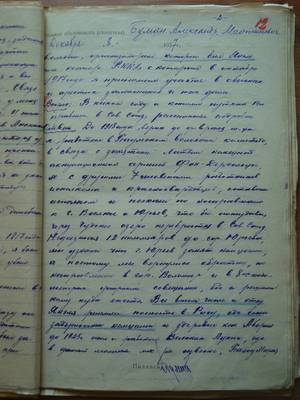



Fund 02 (Б-1) / Inventory 1 / Case Коптиевская Софья Моисеевна
18. Letter from academician I.I. Mints and professor V.M. Dalin [not earlier than 04/02/1984] to the first secretary of the Volgograd regional committee of the Communist Party Kalashnikov V.I. with a request to publish in the newspaper “Volgogradskaya Pravda” an article in memory of Koptievskaya S.M., who passed away from life in October 1983
Fund 02 (Б-1) / Inventory 1 / Case Коптиевская Софья Моисеевна
19. Article by Mints I., Dalin V. and Mikhailov Yu. “Communist of Lenin’s training” in the newspaper “Volgogradskaya Pravda” dated 04/18/1984. about Koptievskaya S.M.
1 лист, 1 изображение, ксерокопия

Bantke Ninel Samuilovna,
Bantke Samuil Samuilovich,
Genkina Esfir Borisovna,
Dalin Victor Markovich,
Dmitrieva Anna Alexandrovna,
Karpov A.G.,
Kirov Sergey Mironovich,
Koptievskaya Sofia Moiseevna,
Krupskaya Nadezhda Konstantinovna,
Mints Isaac Izrailevich,
Mikhailov Yu.,
Pankratova Anna Mikhailovna,
Pelshe Arvid Yanovich,
Ponomarev Boris Nikolaevich,
Suslov Mikhail Andreevich,
Khvostov Vladimir Mikhailovich,
Yaitsky A.,
Yaroslavsky Emelyan Mikhailovich
1984
Fund 02 (Б-1) / Inventory 1 / Case Коптиевская Софья Моисеевна
25. Biographical information on Koptievskaya S.M., compiled by Bantke’s daughter N.S. [after October 26, 1983]
10 листов, 10 изображений, машинопись










Bantke Ninel Samuilovna,
Bantke Samuil Samuilovich,
Bubnova Kaleria Trofimovna,
Wrangel Petr Nikolaevich,
Genkina Esfir Borisovna,
Gopner Serafima Ilyinichna,
Dalin Victor Markovich,
Dmitrieva Anna Alexandrovna,
Karpov A.G.,
Kirov Sergey Mironovich,
Koptievskaya Sofia Moiseevna,
Krupskaya Nadezhda Konstantinovna,
Manfred Albert Zakharovich,
Maslov G.P.,
Mints Isaac Izrailevich,
Nechkina Militsa Vasilievna,
Pankratova Anna Mikhailovna,
Patrina I.F.,
Petrovsky Grigory Ivanovich,
Salnikov,
Khvostov Vladimir Mikhailovich,
Chernaya Alexandra Yakovlevna,
Yumangulova F.Ya.,
Yaroslavsky Emelyan Mikhailovich
1983
Fund 016 / Inventory 1 / Case 13
293-1. Letter of the Federal Security Service of the Russian Federation for the Republic of Sakha (Yakutia) No. 10/1338 dated 11/17/1999 to the director of the Memorial Research Center V.V.
Fund 016 / Inventory 1 / Case 13
293-2. Questionnaire of the arrested Ammosov M.K. , completed 11/21/1937
2 листа, 2 изображения


Ammosov Maxim Kirovich,
Ammosova Aelita Maksimovna,
Ammosova Lena Maksimovna,
Ammosova Yana Maksimovna,
Zakharenko A.,
Iofe Veniamin Viktorovich,
Ordzhonikidze Grigory Konstantinovich (Sergo),
Petrovsky Grigory Ivanovich,
Sineglazova V.,
Stolyarova I.I.,
Tsugel-Ammosova Raisa Izrailevna,
Yaroslavsky Emelyan Mikhailovich
1999
Documents
Link copied to clipboard
